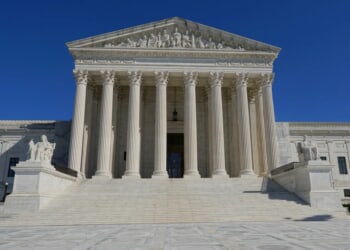As CEO of the Chicago Council on Global Affairs and former U.S. ambassador to NATO in the Obama administration, Ivo Daalder is a member in good standing of the foreign policy establishment. In a recent piece on the Foreign Affairs website, Daalder, after the obligatory criticism of Donald Trump’s alleged undermining of NATO, concludes that Trump has been right all along: Europe is “fully capable of ensuring [its] future security [and] [t]he time to start is now.”
NATO faces the worst crisis in its 76-year history, Daalder writes, because Trump has “questioned the two core principles” of the alliance: its shared threat perception and its commitment to collective defense.
Trump, Daalder writes, has a “low regard for the alliance and its collective defense commitment,” and may withdraw the United States from NATO even in the face of resistance by Congress. Daalder also notes that Defense Secretary Pete Hegseth recently told NATO members that America’s strategic focus is on the Indo-Pacific, not Europe, and that if NATO is to survive, its European members must “take ownership of conventional security on the continent.”
President Trump, of course, has accused NATO’s European members of failing to spend enough for their collective defense and warned the allies that their free ride on the U.S. taxpayer is over. (RELATED: Europe Is No Longer Worth Defending)
Trump has also begun to engage in triangular diplomacy with Russia and China, which includes putting pressure on Ukraine to reach a deal to end the war with Russia. Trump’s rationale for these moves is simple: the greatest threat to American security is in the Indo-Pacific, and therefore, the United States needs to devote more of its limited resources to that strategic theater. In other words, Trump’s “pivot to Asia” is real, unlike Obama’s pivot, which was mostly rhetorical.
As Daalder notes, this is not the first time that NATO’s European (and Canadian) members have disagreed with America’s strategic priorities. In the early to mid-1960s, French President Charles de Gaulle left NATO’s command structure and France developed its own nuclear deterrent, the force de frappe. Several NATO members opposed U.S. policies in Southeast Asia during the Vietnam War.
There were also stark differences over George W. Bush’s Iraq War. NATO survived these “crises” even as it dramatically expanded eastward. Every American president since Eisenhower urged European members to contribute more to their collective defense. Trump, unsurprisingly, has been more blunt about this issue, which is consistent with his overall “America First” approach to domestic and global politics.
Trump has consistently argued that NATO’s European members are capable of providing for their own defense. Daalder agrees and calls for the “Europeanization of NATO,” which will require a substantial increase in defense spending by each European member so that Europe can train, equip, and deploy greater forces into the field. This will take time, he notes, and require the U.S. to cooperate in shifting leadership and overall responsibility for the alliance to Europe. But it is doable. Daalder claims that the shift from American leadership to essentially a European NATO will take at least five years.
A big question about the Europeanization of the alliance relates to NATO’s nuclear deterrent. Daalder speculates that the U.S. may prefer to continue to provide the bulk of that nuclear deterrent, but neither Trump nor his top national security officials have publicly discussed this issue.
If, as Daalder claims, Europe no longer trusts the U.S. commitment to collective defense of the continent, it is likely that Europe will seek to deploy its own nuclear deterrent (beyond that already possessed by the U.K. and France), thereby alleviating the longtime concerns that America would not sacrifice Washington for Berlin or Paris or London. France’s President Emmanuel Macron recently suggested this, and was seconded by Germany’s former finance minister Wolfgang Schauble.
Daalder, of course, would never say outright that Trump is right about NATO. But that is the logic of Daalder’s conclusion. Europe can provide for its own defense. It has triple the population and 10 times the resources of Russia. All it needs is the will to do it, and Trump has made it a necessity. Someday, Europe may thank him.
READ MORE from Francis P. Sempa:
Trump, Populism, and the Ruling Class
Harvard Professor Tells Trump to Channel Ike in Ukraine — Yes!





![Trump's Admin Guts Another ‘Rogue Government Agency with Zero Accountability’ [WATCH]](https://www.right2024.com/wp-content/uploads/2025/03/Trumps-Admin-Guts-Another-‘Rogue-Government-Agency-with-Zero-Accountability-350x250.jpg)


![‘We All Owe Him (Elon) a Huge Debt of Gratitude’ [WATCH]](https://www.right2024.com/wp-content/uploads/2025/03/‘We-All-Owe-Him-Elon-a-Huge-Debt-of-Gratitude-350x250.jpg)








